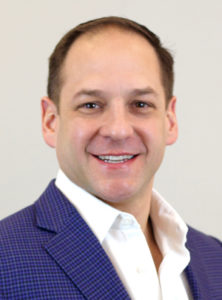Shrinking reimbursement and mounting school debt will continue to force dentists to adopt new, more efficient technologies and nurture the doctor-patient bond.
The dental industry has been in transition, and 2018 brings yet more change. “There are two main areas that I believe will continue to evolve in the dental industry,” says AJ Acierno, DDS, CEO, DecisionOne Dental Partners. “First, we will see changes to the hiring process.” The market is competitive, making it increasingly difficult to hire top team members and dentists, he notes. “Staff and doctor turnover is bad for both the dental practice and the patients,” he points out. In order to hire and keep top talent, dental offices will need to stay ahead of the game and make changes to set themselves apart from traditional offices.

Efficiency in Group Practice: What will be some key opportunities for DSOs in 2018?
AJ Acierno: As more and more dentists and team members experience the DSO model, 2018 is the time that we can control the message of what a DSO is, rather than letting outside media define what we are. For a long time, terms such as DSO and group practice held negative connotations. National and state dental boards, as well as dental schools across the country, would often speak out about how group practice was bad for the field of dentistry. As we continue to see how private practices around the country are functioning, the concern should shift away from what DSOs are teaching and monitoring, to the shortcomings of many private practices. Dentists working alone in private practice have no one monitoring them or giving them feedback on their standard of care. DSOs, on the other hand, provide a network of dentists who, together, create an environment of collaboration, competition and accountability. The result is that many DSOs provide exceptional care; this should be celebrated, not feared. All dentists make mistakes, but having the support from a group practice makes it easier to correct those mistakes and improves both our profession and the quality of care our patients receive.
EGP: What steps should DSOs take to stay ahead of the game in 2018?
Acierno: First, they should focus on technology. We have to find better ways to improve the experience for our patients. When we compare dental to other industries – such as food and entertainment – we are far behind. We have to think like our patients and use technology to improve their experience. The industry is on the cusp of developing technology that will make it much simpler for patients to visit their dentist. Secondly, I think it is time for all dentists to evaluate their relationship with insurance companies. How long will we watch reimbursement negatively impact the quality of dentistry? Of course, insurance provides a great benefit to patients. But we need to think outside the box and come up with ways to help ensure our patients receive quality healthcare, even when reimbursement is low. There are a lot of great ideas circulating. We need organized dentistry and politicians who are willing to fight for quality care. Dentists receive superb education, so it doesn’t make sense to be forced into a system where insurance reimbursements dictate how we practice dentistry.
EGP: How can clinicians and dental team members better connect with their patients in 2018?
Acierno: It’s more important than ever before for dentists to form strong relationships with their patients. Patients are more likely to trust dentists who take the time to get to know them. If we could just connect with those patients who are reluctant to follow through on patient visits and treatment plans, we would be busier and more profitable. That said, I think there are three things that set one office apart from the next:
 Community outreach and philanthropy. People notice when clinicians are actively involved in the community, so the more community service dentists provide, the better.
Community outreach and philanthropy. People notice when clinicians are actively involved in the community, so the more community service dentists provide, the better.- People are busy, so patients appreciate faster office visits. When dentists rely on technology to help their office run efficiently, patients are more likely to have a better experience.
- Social media. Patients want to know about their clinicians on a more personal level. Social media makes it easy for dentists to share information about their office, office outings, their team members’ personal milestones and more.
In addition, dentists should always ask their patients what they do and don’t want. Patients want to have some input in their treatment plan. It requires a lot of communication skills and time to find those secrets that will attract more patients to your office.
EGP: What industry trends will we see in the next several years? How can DSOs plan ahead?
Acierno: I believe staying ahead of technology and using that to improve the patient experience will continue to be essential. Digital analytics will define the dental landscape five years from now. In addition:
- The reliance on insurance and government funding has put many groups in a vulnerable position. We have to decrease that vulnerability as groups grow.
- We must create groups that can increase both the quality of patient care and the quality of our team members’ lives. If we continue to just make decisions based on the bottom line alone, we will lose the fabric that makes our profession great: our relationships with our patients and team members.
“We will continue to deal with the fact that insurance companies will not increase reimbursement any time soon, dentists will graduate from school with huge debt, and a large portion of their salary will continue to go toward student debt repayment,” he says. “If their salaries were increasing at the same rate of dental tuition, I would feel a lot better.”

